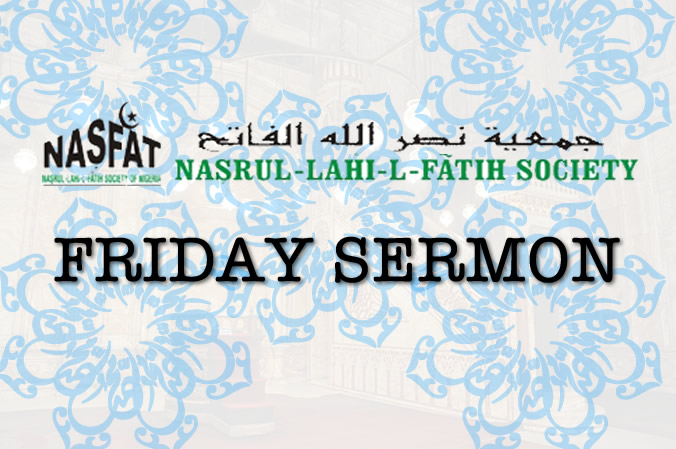NASFAT WEEKLY FRIDAY SERMON FOR FEBRUARY 21, 2020

TOPIC: ISLAM ON SOCIAL JUSTICE
‘Audhu billaahi minash shaytaanir rajeem bismillaahir Rahmanir Raheem. Alhamdu lillaah Rabbil aalameen was salaatu was salaamu ‘alaa rasuulihi al kareem.
Since 2009, every 20 February has been the UN observance known as “World Day of Social Justice”. The purpose of the day is to focus on the plight of social injustice throughout the world and to press for improvements and solutions. Thus, we are discussing the issue of social justice as related to Islam.
Islam has emphasized on numerous principles that organize relationships among members of the society. One of the most important principles is social justice with all the important values that it involves like peace, love, brotherhood, and prosperity. Justice in Islam is not only practiced on Muslims. Rather, it is practiced on every human being regardless to his/her beliefs or religion.
Social justice for the purpose of the observance is seen as including issues of poverty, unemployment, and unfair exclusion that results in economic harm or social ostracism. Social justice and development are integral and compliment each other for the healthy development of a moral and just society. Development should lead to social justice where the most impoverished and marginalized are reached, their basic needs are met, and are enriched and have access to resources as any dignified, independent and free human being.
Islam, being a religion of nature, understands that human beings are born with varying gifts. As they differ in their bodies and their features so they differ in their mental and other capabilities. Their environment, their circumstances and their hereditary gains also differ. In this situation there can be no possibility of economic equality. Thus the existence of economic inequalities among the human beings is but natural. It is also there because Islam allows individual initiative in earning wealth and gives right of private ownership of property. Moreover, existence of inequalities in economic and social life is a part of Divine scheme whereby God tests and tries the people to know who are good and who are bad. To this fact, these Holy Qur’an references are relevant:6 : 165, 16 : 71 and 43 : 32
Despite recognizing inequalities as natural and part of Divine world order, Islam permits differences in wealth within reasonable limits only. It does not tolerate that these differences should grow so wide that some people live their life in absolute luxury while millions are left to lead a life of abject poverty and misery. It does not allow economic disparities turn into an extreme position wherein millions of have-nots’ become serfs and slaves in the hands of few ‘haves’ of the society.
It is equally important to note that social justice according to Islamic conception includes three things, namely : (i) fair and equitable distribution of wealth, (ii) provision of basic necessities of life to the poor and the needy, and (iii) protection of the weak against economic exploitation by the strong.
8) State that the Ideological basis of the above mentioned concept of Islamic social justice are found in the following verses of the Holy Qur’an, Ahadith of Prophet Muhammad (PBUH) and traditions of Prophet’s companions :-
Q4 : 2,6:152,8:41,9:60,16:71,41:10, 55 : 7-9,57:7,59 :7,70 : 24-25)
The Prophet of Islam (SAW) is reported to have said: If anyone spent a night in a town and he remained hungry till morning, the promise of God’s protection for that town came to an end.-(Musnad Ahmad)
The Messenger of Allah(SAW) said: The government is the guardian of anyone who has no guardian.-(Abu Daud, Tirmizi)
Abu Hurairah reported that the Messenger of Allah (SAW) said: One who strives for the widows and the poor is like one who fights in the way of Allah.……..-(Bukhari, Muslim)
The Messenger of Allah (SAW) said: No one’s faith amongst you is reliable until he likes for his brother (in Islam) what he likes for himself. (Bukhari)
Caliph Umar once said : Each and every Muslim has a right in the property of Bait-ul-Mal whether he exercises it or not. -(Kitab-ul-Amwal)
Ali is reported to have said that “God has made it obligatory on the rich to meet the economic needs of the poor up to the extent of their absolute necessities. If they are hungry or naked or involved in other financial difficulties, it will be merely because the rich are not doing their duty. Therefore God will question them about it on the Day of Judgement and will give them due punishment.”
In conclusion, it is worthy to mention the elements of social justice in Islam as:
i) No doubt Islam accepts unequal distribution of wealth as natural and part of Divine Scheme of world order, yet it does not allow existence of wide disparities in distribution of wealth. If distribution of wealth in a community is unfair and unequitable, social peace in that community is always at stake and conflict between the poor and the rich is bound to result in war and class struggle.
ii) Islamic economic system guarantees basic human needs to all the citizens of the Islamic state. Islam enjoins upon the well-to-do to fulfil the needs of the poor and the destitute. According to Al-Quran, the poor and the needy have share in the wealth of the rich.(Q70 : 24-25).
Iii) Elimination of economic exploitation of the weak by the strong is another element of Islamic social justice. Many steps have been taken by Islam in this direction. Riba or usury is one of the worst instruments of human exploitation and this has been abolished root and branch. Other means of human exploitation such as bribery, gambling, speculative transactions, fraudulent practices, prostitution, embezzlement, etc. have also been prohibited in Islamic society. Interest of the weaker classes of the society like women, orphans, slaves, labourers, tenants, consumers, etc. have been protected through detailed legislation by Islam.
And Allah knows best.
UTHMAN ADEKUNLE ANIMASHAUN
Share :
